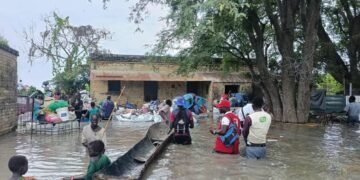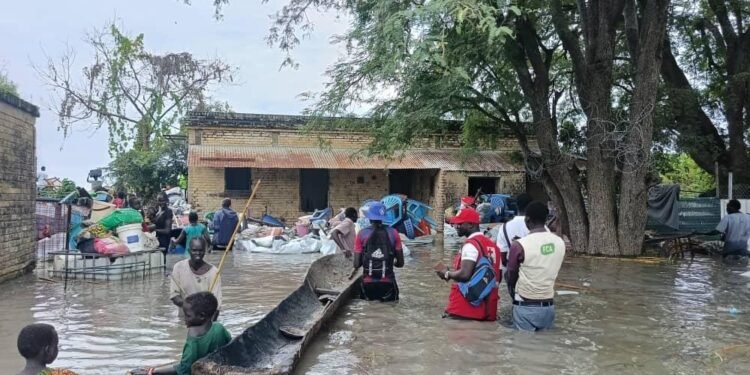Médecins Sans Frontières (MSF) has successfully evacuated over 1,000 people from the South Sudanese town of Old Fangakafter a dyke breach on August 30 caused catastrophic flooding.
In a press statement extended to the Nile Witness MSF said residents, many of whom are women and children, were evacuated to the nearby towns of Toch and Paguir, which are less affected by the floodwaters.
The medical charity organization noted that the dyke, a vital piece of infrastructure protecting the town, broke late on Saturday night despite the urgent efforts of community members to repair it.
“Everyone left immediately, running in all directions, most towards their homes to evacuate their families,” said LonyDiang Top Buom, an MSF staff member and Old Fangakresident.
Upon receiving reports of the disaster, MSF teams mobilized immediately from the nearby town of Toch. The rescue was especially hazardous, as the teams had to travel by boat at night, something they don’t typically do due to safety risks.
“We had to prioritize saving lives that were in imminent danger,” said Atsuhiko Ochiai, MSF deputy head of mission for South Sudan.
MSF coordinated with local authorities to secure larger commercial boats to facilitate the rescue effort.
‘I left with nothing except my family’
The floodwaters surged through the town, forcing many residents to seek refuge on rooftops and dykes.
Malik Nhial Puok Nyakun, another MSF staff member and Old Fangak resident, described the harrowing scene.
“I saw families struggling against the rising waters, their biggest fear being the safety of their children,” he said.
“Many of us left our beds, our belongings, our homes, just to carry the little ones to the dyke and wait for rescue boats. I left with nothing except my family. Everything else is now under water.”
For those remaining in Old Fangak, fear and uncertainty persist as water levels continue to rise.
Many have resorted to using makeshift rafts or are perched precariously on rooftops and dykes, hoping for rescue or for the waters to recede.
Local residents describe the current floods as the worst they have ever seen.
While flooding from heavy rains is common, a dyke breach of this magnitude is unprecedented.
This latest disaster comes on top of years of conflict that have left the community particularly vulnerable.
The situation is expected to worsen with the start of the rainy season.
This isn’t the first time MSF has had to respond to flooding in the region; in 2024, they supported communities in reinforcing dykes to combat severe flooding.
The area remains challenging to access due to ongoing insecurity, and in May 2025, an airstrike forced MSF to close its hospital in Old Fangak. The hospital grounds are now completely submerged.
MSF is continuing to assess the situation. “The main goal is to get people to safety first, then we can assess what kind of assistance they need,” Ochiai said.












